【2015中考复习方案】2015届九年级英语复习课件(山西):第2课时 Units+5—9 [七年级上册](共36张PPT)
文档属性
| 名称 | 【2015中考复习方案】2015届九年级英语复习课件(山西):第2课时 Units+5—9 [七年级上册](共36张PPT) | 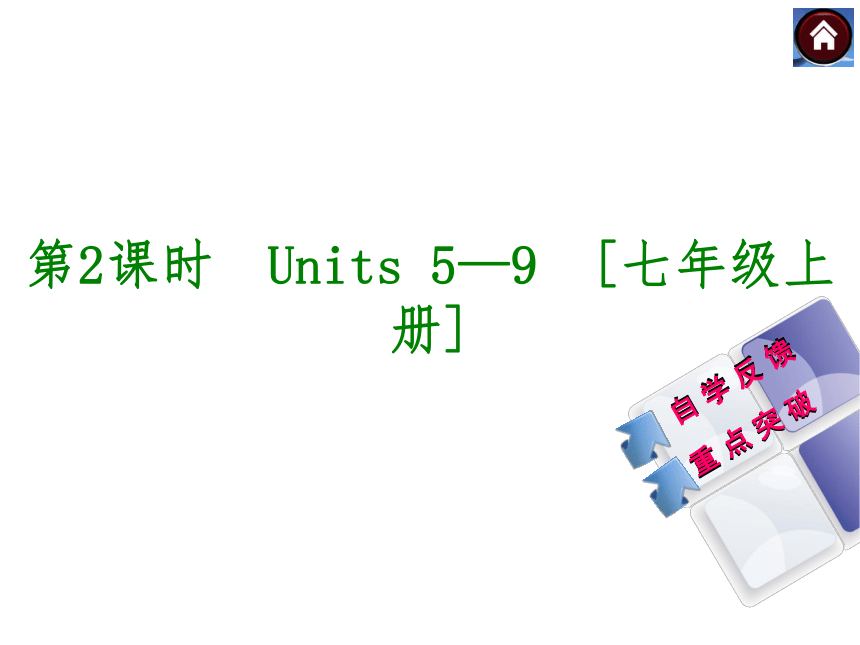 | |
| 格式 | zip | ||
| 文件大小 | 251.1KB | ||
| 资源类型 | 教案 | ||
| 版本资源 | 通用版 | ||
| 科目 | 英语 | ||
| 更新时间 | 2014-12-12 21:50:36 | ||
图片预览

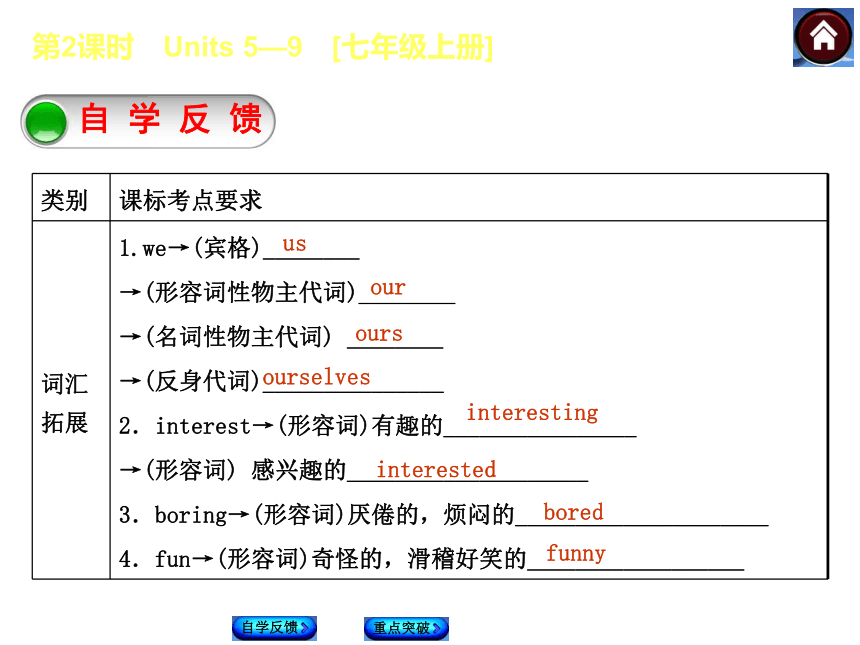
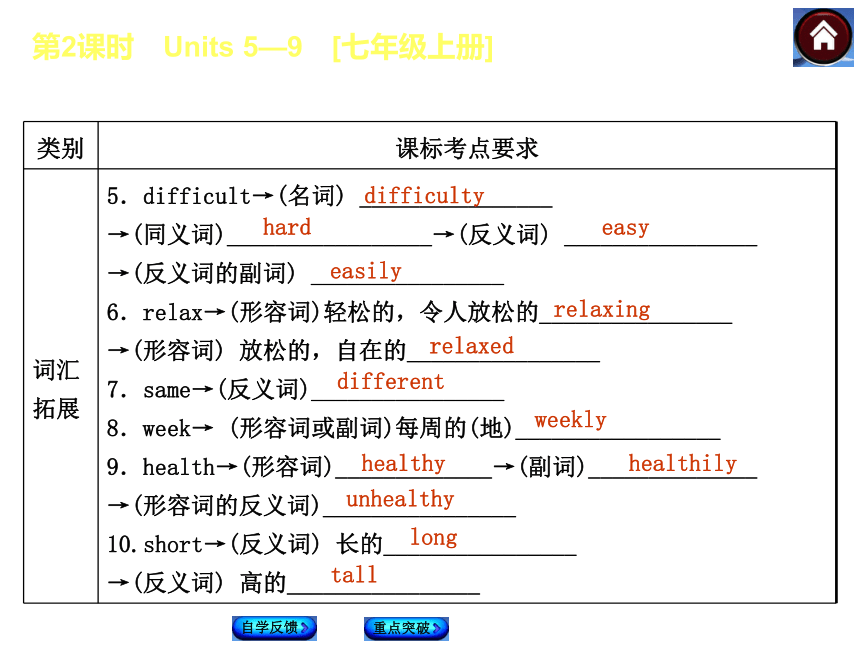
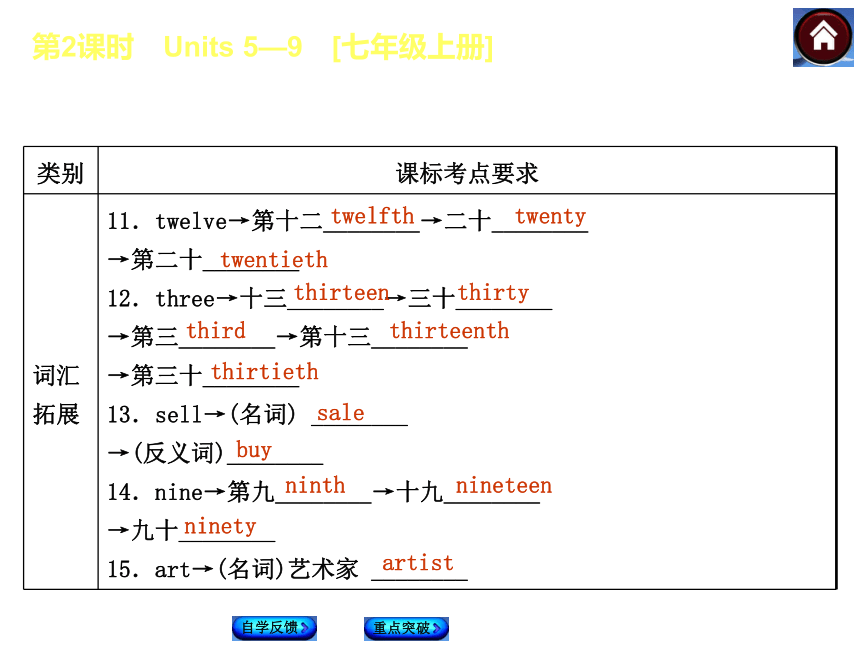
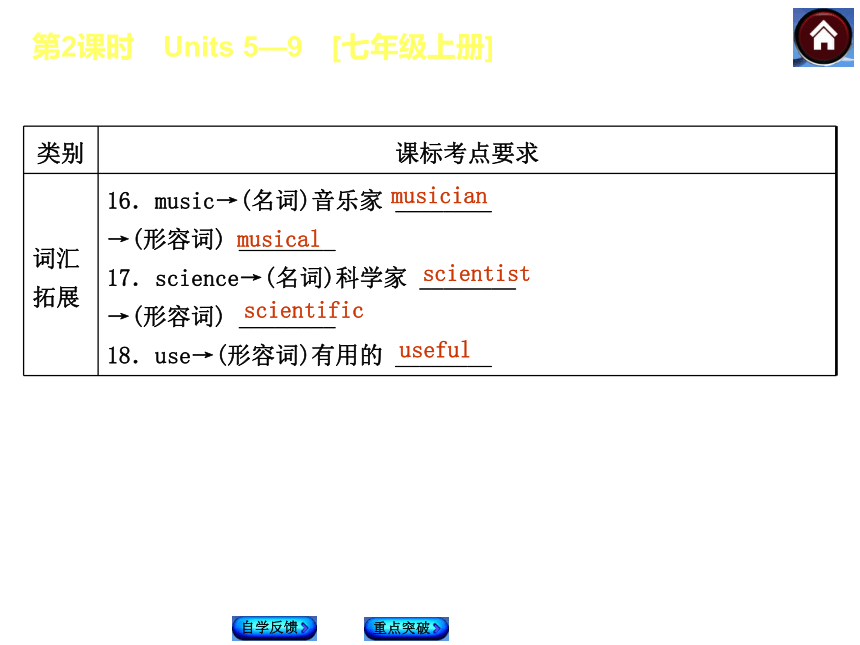
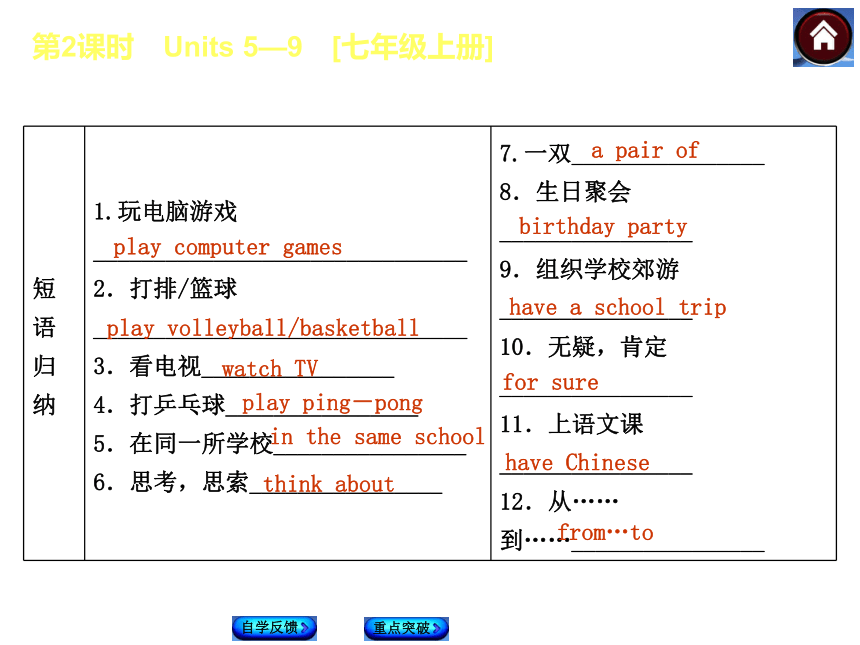
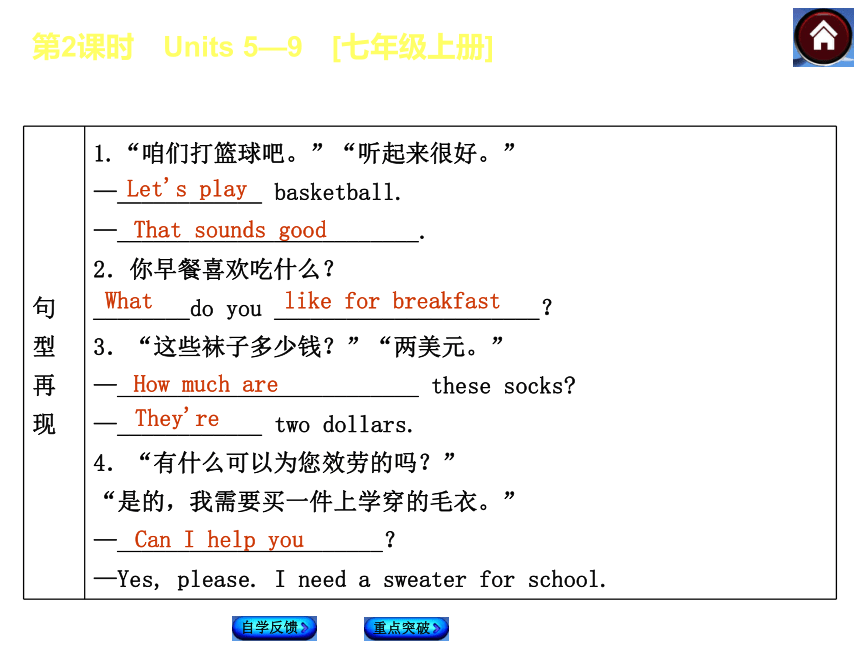
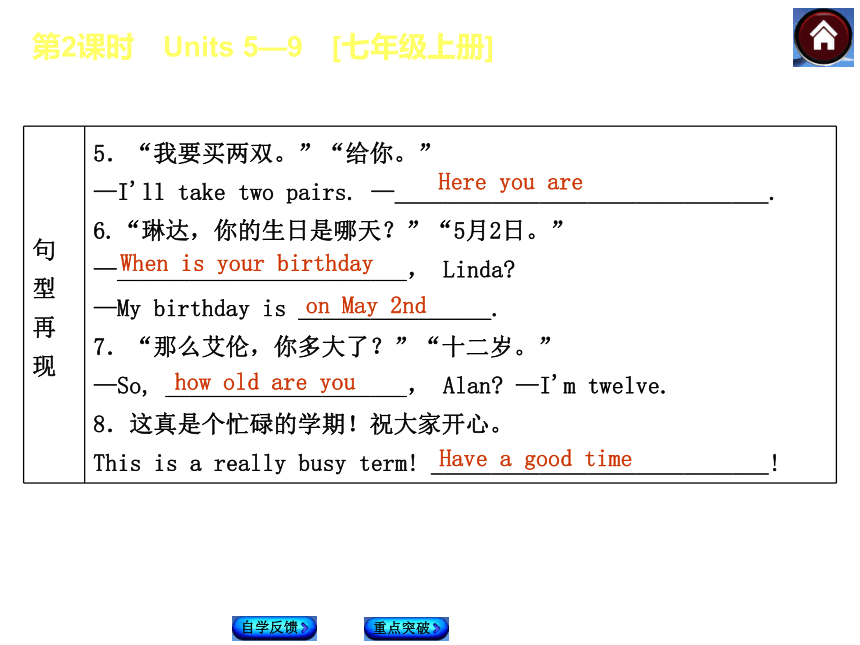

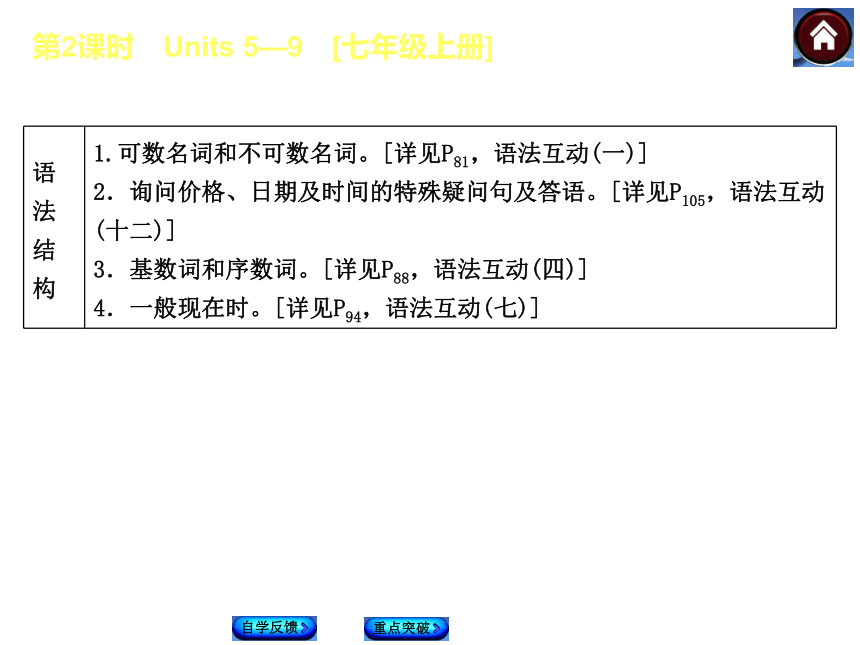
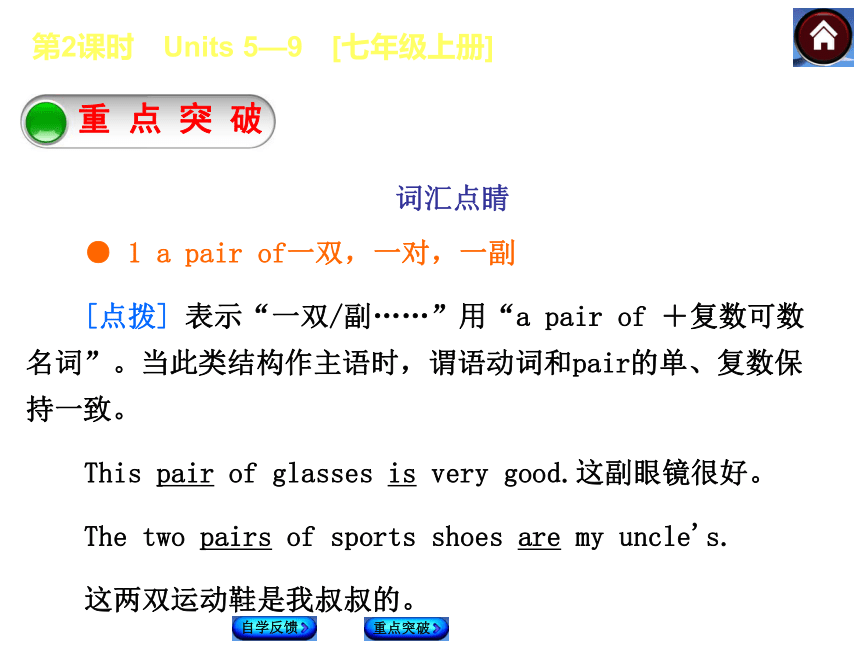
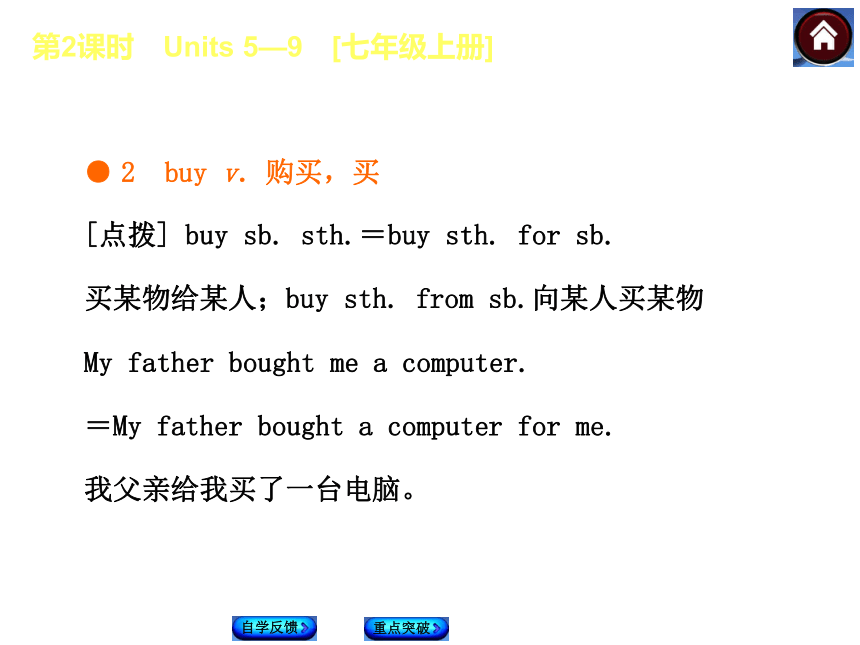
文档简介
课件36张PPT。第2课时 Units 5—9 [七年级上册]第2课时 Units 5—9 [七年级上册]自 学 反 馈 自学反馈重点突破 us our ours ourselves interesting interested bored funny 第2课时 Units 5—9 [七年级上册]自学反馈重点突破 difficulty hard easy easily relaxing relaxed different weekly healthy healthily unhealthy long tall 第2课时 Units 5—9 [七年级上册]自学反馈重点突破 twelfth twenty twentieth thirteen thirty third thirteenth thirtieth sale buy ninth nineteen ninety artist 第2课时 Units 5—9 [七年级上册]自学反馈重点突破 musician musical scientist scientific useful 第2课时 Units 5—9 [七年级上册]自学反馈重点突破 play computer games play volleyball/basketball watch TV play ping-pong in the same school think about a pair of birthday party have a school trip for sure have Chinese from…to 第2课时 Units 5—9 [七年级上册]自学反馈重点突破 Let's play That sounds good What like for breakfast How much are They're Can I help you 第2课时 Units 5—9 [七年级上册]自学反馈重点突破 Here you are When is your birthday on May 2nd how old are you Have a good time 第2课时 Units 5—9 [七年级上册]自学反馈重点突破 What's your favorite subject Why does Because it's interesting 第2课时 Units 5—9 [七年级上册]自学反馈重点突破 第2课时 Units 5—9 [七年级上册]重 点 突 破 词汇点睛自学反馈重点突破 ● 1 a pair of一双,一对,一副
[点拨] 表示“一双/副……”用“a pair of +复数可数名词”。当此类结构作主语时,谓语动词和pair的单、复数保持一致。
This pair of glasses is very good.这副眼镜很好。
The two pairs of sports shoes are my uncle's.
这两双运动鞋是我叔叔的。第2课时 Units 5—9 [七年级上册]● 2 buy v.购买,买
[点拨] buy sb. sth.=buy sth. for sb.
买某物给某人;buy sth. from sb.向某人买某物
My father bought me a computer.
=My father bought a computer for me.
我父亲给我买了一台电脑。自学反馈重点突破 第2课时 Units 5—9 [七年级上册][拓展] buy的反义词为sell,sell的名词形式是sale。常用搭配:
sell sb. sth.=sell sth. to sb. 把某物卖给某人;
on sale 出售,廉价出售;
for sale出售的,待售的,上市的自学反馈重点突破 第2课时 Units 5—9 [七年级上册]● 3 busy adj. 忙碌的;无暇的
[点拨] busy为形容词,它的反义词是free,意为“空闲的”。
Are you busy with your homework?
你正忙于做作业吗?
Mr. Smith is busy writing a letter.
史密斯先生正忙着写信。自学反馈重点突破 第2课时 Units 5—9 [七年级上册] ● 4 finish v.完成,做好
[点拨] finish后常加名词或动名词。
When can you finish (doing) the work?
你何时能完成这项工作?自学反馈重点突破 第2课时 Units 5—9 [七年级上册]巧辨异同自学反馈重点突破 ● 1 sound/noise/voice 第2课时 Units 5—9 [七年级上册][注意] sound还可作连系动词,意为“听起来”,后常接形容词作表语。
It sounds wonderful! 听起来妙极了! 自学反馈重点突破 第2课时 Units 5—9 [七年级上册]自学反馈重点突破 ● 2 look(at)/see/watch/read第2课时 Units 5—9 [七年级上册]Look at the picture. What can you see in it?
看这幅画,你能在里面看到什么?
Would you like to watch a football match with me?
您愿意同我一起去看一场足球赛吗?
My father usually reads newspapers after supper.
我爸爸通常在晚饭后读报纸。自学反馈重点突破 第2课时 Units 5—9 [七年级上册]自学反馈重点突破 ● 3 both/all 第2课时 Units 5—9 [七年级上册]● 4 because of/because
(1)because of 是介词短语,意为“因为……;由于……”,后面接名词(短语)、代词等。
(2)because 意为“因为”,是连词,后接原因状语从句。
We didn't go to the movies because of the rain.
=We didn't go to the movies because it rained.
因为下雨,所以我们没去看电影。自学反馈重点突破 第2课时 Units 5—9 [七年级上册]句型透视自学反馈重点突破 ● 1 Hey, Helen, let‘s go!嘿,海伦,咱们走吧!
Let me get it. 让我去拿它。
[点拨] “Let's…”意为“咱们……吧”。
肯定回答:OK./Sure./Certainly./Good idea./All right.等。
否定回答:Sorry, I…或No, let's…
—Let's go for a walk after supper.
咱们晚饭后去散步吧。
—Good idea. 好主意。第2课时 Units 5—9 [七年级上册][拓展] (1)let sb. do sth.表示“让某人做某事”。
Let him come in.让他进来。
let's是let us的缩写形式,但二者有区别。let's包括听话者,let us不包括听话者。Let's 开头的祈使句,附加问句是shall we;而Let us开头的祈使句,附加问句是will you。自学反馈重点突破 第2课时 Units 5—9 [七年级上册]● 2 I don't want to be fat.我可不想变胖。
[句型] want sth.=would like sth. 想要/需要某物;
want to do sth.=would like to do sth. 想做某事;
want sb. to do sth.=would like sb. to do sth.
想要某人做某事
I want a dictionary. 我想要一本词典。
They want to play tennis.他们想要打网球。
My parents want me to study hard at school.
我的父母想要我在学校努力学习。自学反馈重点突破 第2课时 Units 5—9 [七年级上册]● 3 —How much is this T-shirt? 这件T恤衫多少钱?
—It's seven dollars. 7美元。
[点拨] how much 意为“多少”,在不同的语境中,有不同的含义。
(1)询问价格
How much +be+主语?
=What's the price of…?
=How much does/do…cost?
How much are these shoes?
=What's the price of these shoes?
=How much do these shoes cost? 这些鞋多少钱?自学反馈重点突破 第2课时 Units 5—9 [七年级上册](2)询问不可数名词的数量
How much milk do you want?
你想要多少牛奶?
[拓展] how many也是“多少”的意思,用来询问可数名词的数量。
How many apples do you want?
你想要多少苹果?自学反馈重点突破 第2课时 Units 5—9 [七年级上册]● 4 Here you are.给你。
[点拨] Here it is. 和Here you are.都译为“给你,在这儿”,但其使用场合有所区别:
(1)当所给(递)的东西是对方要求的原物时,两者可通用(Here it is.的复数形式为Here they are.)。
—May I borrow your bike? 我可以借你的自行车吗?
—Here it is.(或Here you are.)这就是。
(2)当对方所给(递)的东西不是对方要求的原物,而是替代物或同类物时,则只能用Here you are。
—I have left my pen at home.自学反馈重点突破 第2课时 Units 5—9 [七年级上册]我把我的钢笔落在家里了。
—Here you are. Use mine. 给你,用我的吧。
[拓展] 购物时,售货员说“Here you are.” 表示“给你。”;乘车到站时,司机说“Here it is.”表示“到站
了。”;若是自己所说“到站了。”则用“Here you are.”;自己发现在找的东西时,常用“Here it is.”,若是别人发现,给你时,常用“Here you are.”。自学反馈重点突破 第2课时 Units 5—9 [七年级上册]● 5 So, how old are you, Alan?
那么,艾伦,你多大了?
[点拨] 自学反馈重点突破 —How old is Jim? =What's Jim's age? 吉姆多大了?
—He is fifteen (years old). 他15岁了。第2课时 Units 5—9 [七年级上册]即时自测自学反馈重点突破 Ⅰ.单项选择
1.The pair of socks ________$4.
A.are B.is C.hasB 当“a pair of+复数可数名词”作主语时,谓语动词用单数形式。第2课时 Units 5—9 [七年级上册]2.—May I use your dictionary? Mine is at home.
—________.
A.Sure. Here you are B.I'd love to
C.You're welcome自学反馈重点突破 A “Sure, Here you are.”意为“当然,给你”;“I'd love to.”意为“我愿意去”; “You're welcome.”意为“不用谢”。句意:“我可以用用你的词典吗?我的在家里。”“当然可以,给你。”故选A。第2课时 Units 5—9 [七年级上册]3.—________ is your sister?
—Seven.
A.How much B.How C.How old 自学反馈重点突破 C 根据答语“Seven.”可知问句是对年龄进行提问,故选C。第2课时 Units 5—9 [七年级上册]4.—What did your sister say to you last night?
—She wanted me ________ my mother her secret.
A.to tell you B.not to tell
C.don't tell自学反馈重点突破 B want sb.to do sth.意为“想要某人做某事”,其否定形式是“want sb.not to do sth.”。第2课时 Units 5—9 [七年级上册]5.My father is very busy ________ every day.
A.work B.works C.working自学反馈重点突破 C be busy doing sth.意为“忙于做某事”。第2课时 Units 5—9 [七年级上册]Ⅱ.选词填空
(A)根据句意,用see, look at, watch或read 的适当形式填空。
1.Did you ________ the football game on TV last night?
2.Don't ________ in the sun. It's bad for your eyes.自学反馈重点突破 watch read 第2课时 Units 5—9 [七年级上册]3.I am ________________ the blackboard, but I can't ________ the words.
(B)根据句意,用noise, sound或voice的适当形式填空。
4.________ travels more slowly than light.
5.The ________ of traffic kept him awake.
6.The girl has a beautiful ________.自学反馈重点突破 looking at see Sound noise voice
[点拨] 表示“一双/副……”用“a pair of +复数可数名词”。当此类结构作主语时,谓语动词和pair的单、复数保持一致。
This pair of glasses is very good.这副眼镜很好。
The two pairs of sports shoes are my uncle's.
这两双运动鞋是我叔叔的。第2课时 Units 5—9 [七年级上册]● 2 buy v.购买,买
[点拨] buy sb. sth.=buy sth. for sb.
买某物给某人;buy sth. from sb.向某人买某物
My father bought me a computer.
=My father bought a computer for me.
我父亲给我买了一台电脑。自学反馈重点突破 第2课时 Units 5—9 [七年级上册][拓展] buy的反义词为sell,sell的名词形式是sale。常用搭配:
sell sb. sth.=sell sth. to sb. 把某物卖给某人;
on sale 出售,廉价出售;
for sale出售的,待售的,上市的自学反馈重点突破 第2课时 Units 5—9 [七年级上册]● 3 busy adj. 忙碌的;无暇的
[点拨] busy为形容词,它的反义词是free,意为“空闲的”。
Are you busy with your homework?
你正忙于做作业吗?
Mr. Smith is busy writing a letter.
史密斯先生正忙着写信。自学反馈重点突破 第2课时 Units 5—9 [七年级上册] ● 4 finish v.完成,做好
[点拨] finish后常加名词或动名词。
When can you finish (doing) the work?
你何时能完成这项工作?自学反馈重点突破 第2课时 Units 5—9 [七年级上册]巧辨异同自学反馈重点突破 ● 1 sound/noise/voice 第2课时 Units 5—9 [七年级上册][注意] sound还可作连系动词,意为“听起来”,后常接形容词作表语。
It sounds wonderful! 听起来妙极了! 自学反馈重点突破 第2课时 Units 5—9 [七年级上册]自学反馈重点突破 ● 2 look(at)/see/watch/read第2课时 Units 5—9 [七年级上册]Look at the picture. What can you see in it?
看这幅画,你能在里面看到什么?
Would you like to watch a football match with me?
您愿意同我一起去看一场足球赛吗?
My father usually reads newspapers after supper.
我爸爸通常在晚饭后读报纸。自学反馈重点突破 第2课时 Units 5—9 [七年级上册]自学反馈重点突破 ● 3 both/all 第2课时 Units 5—9 [七年级上册]● 4 because of/because
(1)because of 是介词短语,意为“因为……;由于……”,后面接名词(短语)、代词等。
(2)because 意为“因为”,是连词,后接原因状语从句。
We didn't go to the movies because of the rain.
=We didn't go to the movies because it rained.
因为下雨,所以我们没去看电影。自学反馈重点突破 第2课时 Units 5—9 [七年级上册]句型透视自学反馈重点突破 ● 1 Hey, Helen, let‘s go!嘿,海伦,咱们走吧!
Let me get it. 让我去拿它。
[点拨] “Let's…”意为“咱们……吧”。
肯定回答:OK./Sure./Certainly./Good idea./All right.等。
否定回答:Sorry, I…或No, let's…
—Let's go for a walk after supper.
咱们晚饭后去散步吧。
—Good idea. 好主意。第2课时 Units 5—9 [七年级上册][拓展] (1)let sb. do sth.表示“让某人做某事”。
Let him come in.让他进来。
let's是let us的缩写形式,但二者有区别。let's包括听话者,let us不包括听话者。Let's 开头的祈使句,附加问句是shall we;而Let us开头的祈使句,附加问句是will you。自学反馈重点突破 第2课时 Units 5—9 [七年级上册]● 2 I don't want to be fat.我可不想变胖。
[句型] want sth.=would like sth. 想要/需要某物;
want to do sth.=would like to do sth. 想做某事;
want sb. to do sth.=would like sb. to do sth.
想要某人做某事
I want a dictionary. 我想要一本词典。
They want to play tennis.他们想要打网球。
My parents want me to study hard at school.
我的父母想要我在学校努力学习。自学反馈重点突破 第2课时 Units 5—9 [七年级上册]● 3 —How much is this T-shirt? 这件T恤衫多少钱?
—It's seven dollars. 7美元。
[点拨] how much 意为“多少”,在不同的语境中,有不同的含义。
(1)询问价格
How much +be+主语?
=What's the price of…?
=How much does/do…cost?
How much are these shoes?
=What's the price of these shoes?
=How much do these shoes cost? 这些鞋多少钱?自学反馈重点突破 第2课时 Units 5—9 [七年级上册](2)询问不可数名词的数量
How much milk do you want?
你想要多少牛奶?
[拓展] how many也是“多少”的意思,用来询问可数名词的数量。
How many apples do you want?
你想要多少苹果?自学反馈重点突破 第2课时 Units 5—9 [七年级上册]● 4 Here you are.给你。
[点拨] Here it is. 和Here you are.都译为“给你,在这儿”,但其使用场合有所区别:
(1)当所给(递)的东西是对方要求的原物时,两者可通用(Here it is.的复数形式为Here they are.)。
—May I borrow your bike? 我可以借你的自行车吗?
—Here it is.(或Here you are.)这就是。
(2)当对方所给(递)的东西不是对方要求的原物,而是替代物或同类物时,则只能用Here you are。
—I have left my pen at home.自学反馈重点突破 第2课时 Units 5—9 [七年级上册]我把我的钢笔落在家里了。
—Here you are. Use mine. 给你,用我的吧。
[拓展] 购物时,售货员说“Here you are.” 表示“给你。”;乘车到站时,司机说“Here it is.”表示“到站
了。”;若是自己所说“到站了。”则用“Here you are.”;自己发现在找的东西时,常用“Here it is.”,若是别人发现,给你时,常用“Here you are.”。自学反馈重点突破 第2课时 Units 5—9 [七年级上册]● 5 So, how old are you, Alan?
那么,艾伦,你多大了?
[点拨] 自学反馈重点突破 —How old is Jim? =What's Jim's age? 吉姆多大了?
—He is fifteen (years old). 他15岁了。第2课时 Units 5—9 [七年级上册]即时自测自学反馈重点突破 Ⅰ.单项选择
1.The pair of socks ________$4.
A.are B.is C.hasB 当“a pair of+复数可数名词”作主语时,谓语动词用单数形式。第2课时 Units 5—9 [七年级上册]2.—May I use your dictionary? Mine is at home.
—________.
A.Sure. Here you are B.I'd love to
C.You're welcome自学反馈重点突破 A “Sure, Here you are.”意为“当然,给你”;“I'd love to.”意为“我愿意去”; “You're welcome.”意为“不用谢”。句意:“我可以用用你的词典吗?我的在家里。”“当然可以,给你。”故选A。第2课时 Units 5—9 [七年级上册]3.—________ is your sister?
—Seven.
A.How much B.How C.How old 自学反馈重点突破 C 根据答语“Seven.”可知问句是对年龄进行提问,故选C。第2课时 Units 5—9 [七年级上册]4.—What did your sister say to you last night?
—She wanted me ________ my mother her secret.
A.to tell you B.not to tell
C.don't tell自学反馈重点突破 B want sb.to do sth.意为“想要某人做某事”,其否定形式是“want sb.not to do sth.”。第2课时 Units 5—9 [七年级上册]5.My father is very busy ________ every day.
A.work B.works C.working自学反馈重点突破 C be busy doing sth.意为“忙于做某事”。第2课时 Units 5—9 [七年级上册]Ⅱ.选词填空
(A)根据句意,用see, look at, watch或read 的适当形式填空。
1.Did you ________ the football game on TV last night?
2.Don't ________ in the sun. It's bad for your eyes.自学反馈重点突破 watch read 第2课时 Units 5—9 [七年级上册]3.I am ________________ the blackboard, but I can't ________ the words.
(B)根据句意,用noise, sound或voice的适当形式填空。
4.________ travels more slowly than light.
5.The ________ of traffic kept him awake.
6.The girl has a beautiful ________.自学反馈重点突破 looking at see Sound noise voice
